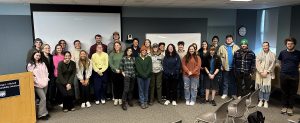EES 489 Capstone Conference Fall 2023
 Last fall, as the semester ended, two sections of EES 489 (Critical Issues in Ecology and Environmental Sciences) joined together to convene the 2023 Ecology and Environmental Sciences Capstone Conference.
Last fall, as the semester ended, two sections of EES 489 (Critical Issues in Ecology and Environmental Sciences) joined together to convene the 2023 Ecology and Environmental Sciences Capstone Conference.
Over the duration of the semester, the 30 students enrolled across two sections (instructed by Dr. Amanda Klemmer and Dr. Kiley Daley) completed the full cycle of a research project: from defining an important question, to sourcing and analyzing data, all the way through reporting results.
This two-day event was a celebration of their achievements and an opportunity to share their research with the broader EES community in a professional conference setting. Held in Norman Smith Hall, the conference featured nine group presentations spanning a range of topics (listed below).
Congratulations to all participants!
Day 1 Tuesday, November 28th
Anthropogenic impacts on marine species in the Gulf of Maine
Skylar Basich, Jorja Hooper, James McKinney, and Jake Arbour
Predicting the movements of invasive insects
Sophie Whiting, John Masselli, and Daniel Herrero
Climate change impacts on crop pollinators
Lauren Gurney, Stephen Pinto, and Amanda Dodge
Rising Ocean Temperatures and Vibrio Related Illnesses in New England
Rachel Chase, Brendan Fitzgerald, Isabel Ralston, and Peyton Sheaffer
Effects of Climate Change on Tick-Borne Diseases in the Northeast United States
Angelo Palome, Olivia Scott, and Alyssa Singer
Day 2 Thursday, November 30th
Socioeconomic Effects of Farming Genetically Modified vs. Non-Genetically Modified Crops in Low-Income Global Populations
Rowan Andrews, Kalina Kinyon, and Maeve Wivell
Exploring Trends between Increases in Extreme Weather Events and Waterborne Illness in the Southeast United States from 2009-2021
Jessica Catalano, Caitlin Cavanaugh, Chloe Gale, and Chelsea Gilgan
Species range shifts in alpine ecosystems and their impacts on species interactions
Hannah Bradish, Caileigh Judson, Teagan Russell
Ocean temperature effects on marine organism breeding and migration ranges
Sara York, Caroline Clemmer, and Elissa Tuten
